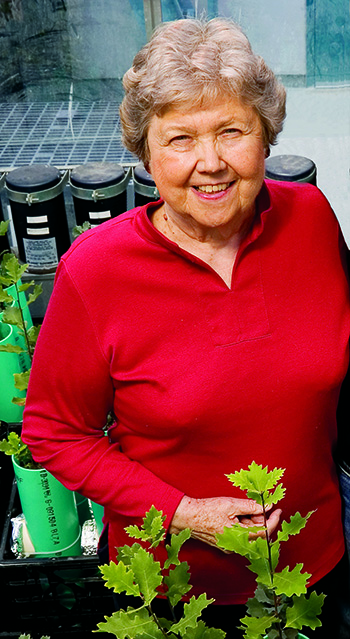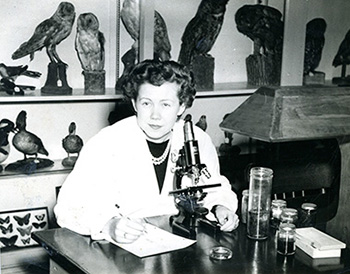Campus News
Pioneering plant scientist Jean Langenheim dies at 95
Jean Langenheim, an eminent plant ecologist and leading authority on amber and plant resins, died on Sunday, March 28, in Santa Cruz. She was 95.



Jean Langenheim, an eminent plant ecologist and leading authority on amber and plant resins, died on Sunday, March 28, in Santa Cruz. She was 95.
A professor emerita of ecology and evolutionary biology at UC Santa Cruz, Langenheim conducted field research on five continents, crossed the disciplinary boundaries of botany, geology, and chemistry, served as president of four different scientific societies, and broke new ground for women in science.
“Jean was a remarkable person who forged new pathways in her personal scientific research, overcame the many barriers to women scientists as she built her scientific program, contributed to the establishment and furthering of entire scientific disciplines, and mentored generations of students,” said John Thompson, professor of ecology and evolutionary biology at UCSC.
“She was a lion in her field,” added Ingrid Parker, professor of ecology and evolutionary biology at UCSC. “She was such a trailblazer herself, yet she was always thinking about how to promote the next generation and create opportunities for young scientists.”
Langenheim studied plant resins and amber (fossilized resin) for more than 40 years, and her 2003 book Plant Resins is the authoritative reference book on the subject. Her investigations covered every aspect of plant resins, including their chemistry, their roles in the ecology of the plants that produce them, the evolutionary history of resin-producing plants, and the many uses of resins throughout human history.
She conducted the first chemical analyses to determine the biological sources of amber, and her 1969 paper in the journal Science became a classic, establishing her as the world’s leading authority on the botanical origins of amber. Her interdisciplinary research on the ways in which plants use chemicals to defend themselves from pathogens and herbivores helped establish the field of chemical ecology.
“She transformed chemical ecology with her pioneering research,” Parker said.
Langenheim began her career at a time when professional opportunities for women in science were limited. At UC Santa Cruz, she was the campus’s first female faculty member in the natural sciences and the first woman to be promoted to full professor. She later became the first woman to serve as president of the Association for Tropical Biology and the International Society of Chemical Ecology, as well as the second woman president of the Ecological Society of America and the Society of Economic Botany.
In her memoir, The Odyssey of a Woman Field Scientist, Langenheim wrote, “I lived through the period of being the token woman in numerous situations; I was not an activist fighting on the front lines, so to speak, but tried to demonstrate the capability of women through my own hard work and accomplishments.”
Langenheim was born in 1925 in Homer, Louisiana, to Jeanette Smith and Vergil Wilson Harmon. In the early 1930s, the family moved to Tulsa, Oklahoma, where she graduated from high school in 1943 and from the University of Tulsa in 1946 with a B.S. in biology. In 1946, she married Ralph Langenheim, a geology student, and they did their doctoral research together at the University of Minnesota, where she studied with the ecologist William S. Cooper. She earned her M.S. in 1949 and Ph.D. in 1953, both in botany.
When her husband joined the faculty at UC Berkeley, Langenheim took a research associate position in the botany department. She was also an assistant professor at San Francisco College for Women and taught field ecology and botany at the Rocky Mountain Biological Laboratory in Colorado. She and her husband moved to the University of Illinois in 1959, where she continued her studies in ecology and paleobotany as a research associate.
After a divorce in 1962, Langenheim became a scholar at the Radcliffe Institute for Independent Studies (now the Radcliffe Institute for Advanced Study) and a research fellow in biology at Harvard University. At Harvard, she began exploring the chemical analysis of amber samples she had collected in Chiapas, Mexico, on an expedition she and her husband had participated in while still at the University of Illinois. Her discovery that the amber came from a tropical flowering tree upended the common assumption that all amber was produced from pines.
Langenheim came to UC Santa Cruz in 1966, the campus’s second year, as an assistant professor of biology. She worked closely with the plant physiologist Kenneth Thimann, helping to establish a strong program in plant sciences at UCSC. Over the years, Langenheim and Thimann taught thousands of undergraduates in their popular botany course, “Plants and Human Affairs,” and they coauthored a textbook for the course.
“It was an intriguing move from [Harvard] the oldest university, full of rich tradition, to a new campus bursting with innovation,” she wrote in her memoir.
Langenheim played an important role in the establishment of the graduate studies program at UC Santa Cruz. She sponsored or cosponsored more than 40 graduate students, including students from Brazil and Mexico, and her lab included postdoctoral fellows and visiting faculty from Korea, China, and New Zealand. She did field research around the world, through much of Mexico and Central and South America, as well as Europe, Africa, Australia, and New Zealand.
While Langenheim’s research focused on the evolution and ecology of tropical trees, her students also studied the chemical ecology of redwoods and other plants native to the California coast. Many of her former graduate students stayed in close contact with her through the years, and she considered them her “surrogate family.”
Langenheim served on a variety of advisory boards for UC and for national and international organizations, including the Environmental Protection Agency and the International Union of Biological Sciences. A fellow of the American Association for the Advancement of Science, the Ecological Society of America, and the California Academy of Sciences, she received the California Academy’s highest honor, the Fellows Medal, in 2006.
Although she officially retired in 1994, Langenheim remained active as a professor emerita, supervising graduate students and publishing several major syntheses of research on amber and chemical ecology.
Langenheim provided generous philanthropic support for research on the ecology and evolution of plants. She endowed graduate fellowships in plant ecology and evolution at UC Santa Cruz and at the Rocky Mountain Biological Laboratory, as well as a graduate fellowship in the field sciences for Sigma Delta Epsilon/Graduate Women in Science. She also endowed a faculty chair at UCSC, the Jean H. Langenheim Endowed Chair in Plant Ecology and Evolution. In support of the UC Santa Cruz Arboretum, she endowed a program to foster and strengthen ties between the Arboretum and plant science faculty and students for research and teaching.
Langenheim also loved animals and established a program at the Santa Cruz SPCA, known as “Blackie’s Senior Friends,” to match older animals with senior citizens. She requested that donations in her memory be made to the Jean H. Langenheim Endowed Graduate Fellowship fund at UC Santa Cruz.
